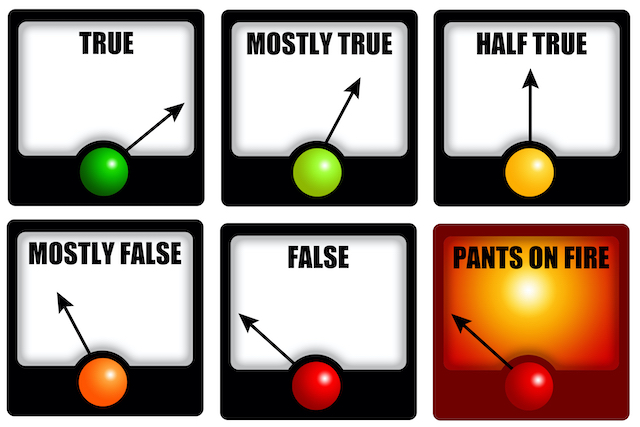Missing the Point – Liar, Liar
Pants on fire. If only it were that easy to determine who’s telling the truth and who’s not.
One of the earliest lessons my parents taught me was about the importance of telling the truth. Their reasoning was simple enough, but nonetheless profound given the scope of the case they were making. A great deal of what we do, as individuals and in the society we create, depends upon the ability of others to trust, to take for granted the integrity of what we say and what we do. Lying is dishonest. Ultimately, we are nothing of any particular value if we are not honest with ourselves and the people with whom we have relationships.
“Yeah. Wow. Your parents were having that talk with you when you were, what, how old?”
I don’t know. Maybe five. The specific words they used were probably much simpler and I was heavily influenced by the example they set. No doubt, I’ve embellished their message considerably but, whatever they said and did, it’s been stuck in my head all these years.
To be fair, my mother also taught me that it was better to tell the truth because it was easier to remember rather than having to construct all manner of details when you’re faking it. Unfortunately, I’ll never know under precisely what circumstances she realized what she was explaining. Should have asked her when I had the chance.
As I got older, it became apparent that my parents’ advice about the truth was more of a general guideline than a hard and fast rule. There were what they called “white lies” of course – a politically unacceptable term, if ever there was one – that were circumstantially acceptable in polite society. Generally, there were times when it was okay to step aside from reality when the simple truth might be hurtful or misunderstood. And there was hyperbole which was always a staple in marketing and politics.
Well, ladies and gentlemen, in just the few decades since I was taught the value of telling the truth, you can toss all that good, moral stuff in the trash can. We have become a nation of liars. So all-pervasive is this lying, particularly among our elected leadership, that we have generally become desensitized to it and now take it more or less for granted.
Believe me when I tell you that there is no greater threat to our democracy and American society in general that the erosion of truth.
There is, for example, an entire cable news network – the name of which rhymes with “Fox” – the primary marketing strategy of which is to differentiate itself from the competition by lying to its viewers. Maybe it’s time for the FCC to regulate cable news networks the way they license broadcast TV stations.
The person we elected President in 2016 was and still is known to be a serial liar. Forget about his various other psychological disorders and his self-serving disinterest in differentiating between what’s true and what’s not. Forget about all that. We elected this clown not only despite his lying to us, but because many voters actually preferred the ludicrous vision he was pitching. Had this particular candidate – who, not incidentally, is running again – been stronger intellectually and a little less nuts – who knows what larger mess his administration might have spawned.
Newly elected Congressman George Santos is clearly a pathological liar and yet he remains in office. Not only has he not been sanctioned and tossed out of Congress as he should be, but he’s getting support, in a manner of speaking, from Speaker McCarthy who has his own issues with the consistency of positions he has taken. The only truth is that the Republicans need Santos’ vote in the House to protect their slim majority. Choosing to ignore Mr. Santos dishonesty is, of course, a special form of lying, relative to the oath and other implied promises these politicians made to their constituents.
And then there is the Chinese spy balloon crisis, still underway. Rather than joining with President Biden in his celebration of a surprisingly positive jobs report… Rather than making productive suggestions related to the meaning of these data, Republicans have chosen instead to distract us by focusing their criticism of President Biden on the timing of when the Chinese balloon should have been shot down. Having determined that the balloon was no real threat to our national security, the President was advised by the Pentagon to wait until the balloon was offshore to avoid any potential harm that debris might have on people and property. The Republicans, whose one trick is to criticize everything Democrats say or do, argue that it was irresponsible to wait.
Now, who among you reading this doesn’t believe that, had President Biden ordered the balloon shot down over the United States, Republicans would have taken precisely the opposite position? Because that’s all they know how to do. And that’s two forms of lying, isn’t. One form is the faking of a crisis to distract the public from good economic news. The other is the complete lack of sincerity in the position they’ve taken which is nothing but political positioning without any underlying substance.
“So why is there so much lying going around?”
The short answer is that there doesn’t seem to be any penalty for not telling the truth. Notwithstanding my mother’s admonitions about the difficulty of maintaining the lie, deviations from truthfulness appear to have become more, not less difficult to discern. And there’s the fact that people have been overwhelmed by the volume of it all. Lying has become so much background noise that we’re oblivious to it.
You’ve got competing sources of news presenting various alternative realities, some blatant, some nuanced. You’ve got social media and a 24-hour news cycle repeating the dishonest statements ad nauseum. All of it against the background of a public who was raised – like you and me – to assume that authorities would tell them the truth at least most of the time and doesn’t see the onslaught of lies coming in all its various forms.
Let’s face it, lying – a/k/a “cheating” – has become an acceptable short-cut to fame and success and to accomplishing your objectives in general. And that’s not a good thing. As a matter of principle, we do not want and, as a practical matter, we cannot survive in a world without being able to depend upon the integrity of people who lead and represent us.
“So, what do we do about it?”
Three things come to mind. Work hard, individually, to be more discerning of the truth. Learn to know who’s being honest with you and who’s not. Get big money out of our elections. And change the structure of our primaries so that the majority rules, so that a minority of confused voters can’t elect dishonest people to office. To do otherwise is clearly missing the point.

Les Cohen is a long-term Marylander, having grown up in Annapolis. Professionally, he writes and edits materials for business and political clients from his base of operations in Columbia, Maryland. He has a Ph.D. in Urban and Regional Economics. Leave a comment or feel free to send him an email to [email protected].

